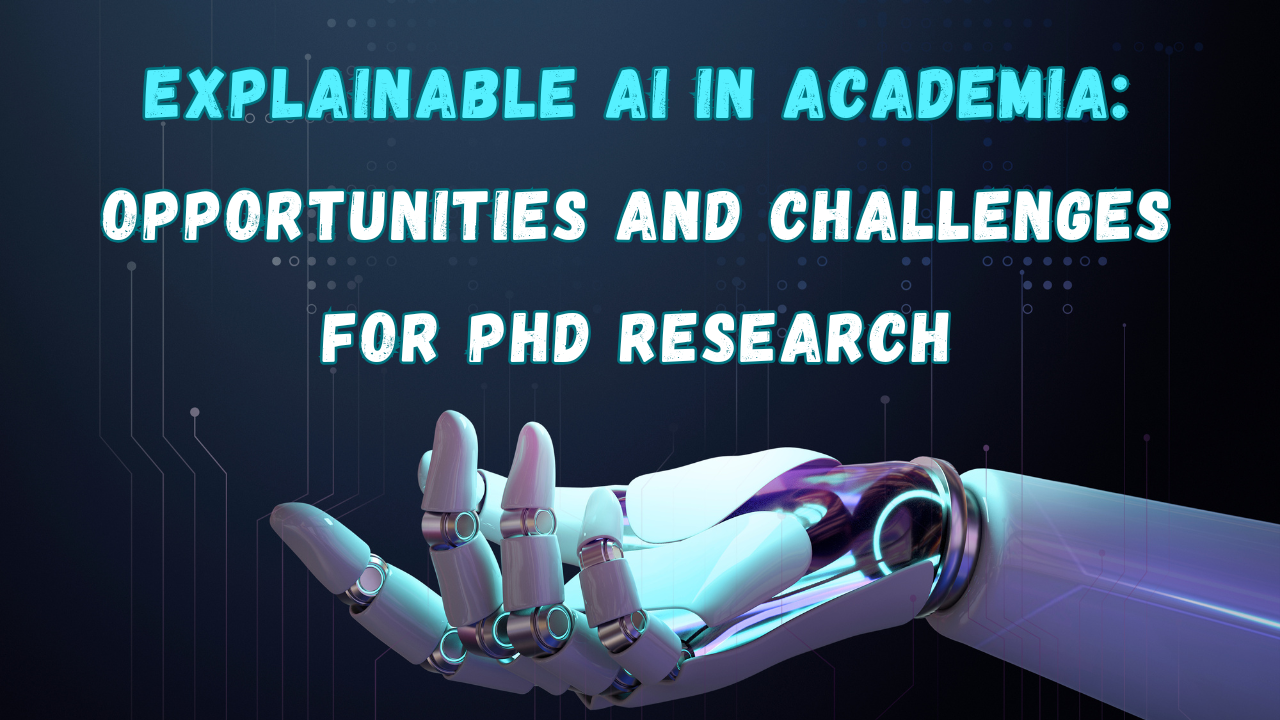31Jan

Artificial Intelligence (AI) has infiltrated almost any sector, and thus, it should not come as a surprise that AI in academia is also on this trajectory. With AI-driven platforms constantly improving, AI in academia achieved tremendous importance in academic research. AI lies at an interesting intersection of technological innovation, ethical obligation, and social consideration for PhD students willing to tread along this path. This blog will speak about opportunities and challenges in utilizing Explainable AI in academic research with a focus on the lives of PhD candidates.

Now more than ever, governments, academic institutions, fundraising organizations, and private entities are paying their attention to, and funding for, DV AI and its definition. They provide grants, fellowships, and partnerships from some institutions for the further exploration by doctoral students. Among them are DARPA and EU Horizon programs calling for business in AI research.
AI was stated to be used in high-stakes domains: healthcare, law, and finance. Any contribution explaining AI on the behalf of a PhD might well be transposed into other technologies advanced to assist society- like an explainable medical diagnostic tool informing physicians’ decision-making processes.
AI formally means Explainable Artificial Intelligence being among the hottest topics in AI research. This also translates into a large number of conference papers being sought after by conferences such as NeurIPS, ICML, and IJCAI. Strong research for the AI morrow may await, giving passage to great academic visibility, collaborations, and even career opportunities wherein the PhD candidate’s voice echo.
High-performing AI models derive this ability from their architectures’ complexity, with deep neural networks standing out as the front-runners. Such models have suffered high access levels. In order to enhance explainability, one may find that simplifications come at the cost of predictive accuracy; it becomes very hard for him/her to strike the right balance.
Measuring quality of explanations remains open questions. While many criteria have been proposed-such as fidelity, completeness, and consistency-there is yet to be a consensus on how to assess them. The enduring lack of standardization allows an inventor to possibly confound the benchmarking work of that researcher.
If an explanation reveals extreme transparency, sensitive information like proprietary algorithms or even private user information might be exuded. This is tricky for researchers as they have to navigate the ethical dilemmas of their work, ensuring it retains compliance with data privacy and intellectual property regulations.
Explainable AI in academia is one hot destination for research, giving PhD students a chance to contribute to technological novelties and societal good. Although the road is expectedly marred with challenges, the scope for meaningful work in AI in academia is enormous. Interdisciplinary collaboration, ethical responsibility, and a user-centered approach will give PhD researchers the potential to steer the AI of the future to be not only smart but also transparent and fair.
Kenfra Research understands the challenges faced by PhD scholars and offers tailored solutions to support your academic goals. From topic selection to advanced plagiarism checking.
MKU to conducted common entrance test for M Phil, PhD MKU could refer to multiple institutions or organizations. However, one... read more
Transitioning from mathematics to physics for a high-paying PhD program can be a rewarding academic and career move. Here are... read more
IIT Delhi’s Certificate Programme in Data Science & Machine Learning will equip you with a skillset for this growing field IIT... read more

Writing an abstract is a very important part of academic writing. If you are a student, researcher, or scholar, you’ll... read more

When working on a research paper, thesis, or dissertation, presenting your findings effectively is crucial. It’s just as important as... read more

Writing a literature survey for an IEEE paper can feel overwhelming at first, especially if you are new to research... read more
Madurai Kamaraj University to conduct CET for PhD, M Phil admissions on October 8 Madurai Kamaraj University: Madurai Kamaraj University, located in... read more
WhatsApp us
Leave a Reply